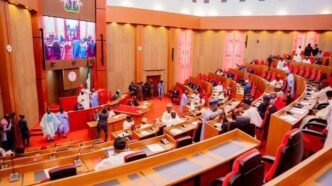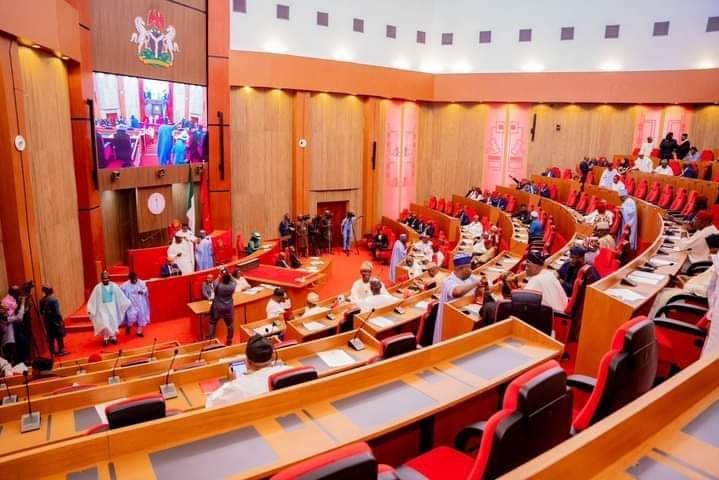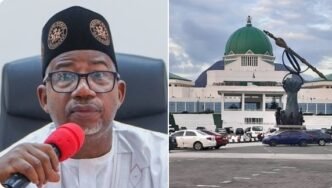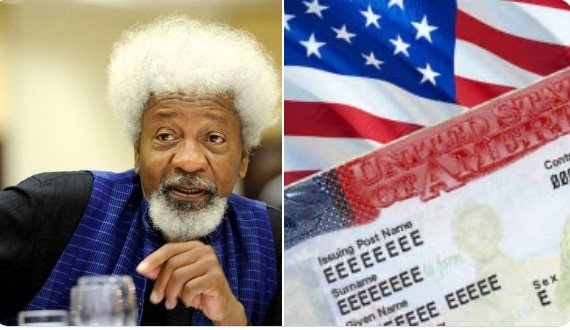The Nigerian Senate on Thursday, October 30, 2025, began deliberation on a bill seeking to establish a National Centre for Autism with zonal branches across the six geopolitical regions of the country. The proposed legislation aims to institutionalise research, early diagnosis, care, and nationwide awareness on Autism Spectrum Disorder (ASD), marking a significant milestone in the nation’s commitment to inclusive healthcare and social development.
The bill, sponsored by Senator Natasha Akpoti-Uduaghan (Kogi Central), seeks to create a specialised government institution responsible for coordinating autism-related programmes, promoting professional training, and facilitating collaboration among healthcare professionals, educators, and families affected by ASD.
A Landmark Step for Autism Inclusion
Presenting the bill at plenary, Senator Akpoti-Uduaghan described autism as a complex neurodevelopmental condition that affects communication, social interaction, and behaviour. She explained that while autism manifests differently in individuals, early detection and tailored intervention remain critical for improving outcomes and promoting meaningful inclusion.
“Autism Spectrum Disorder is not a disease, but a developmental condition that requires understanding, acceptance, and structured support. This bill seeks to institutionalise early detection, research, and specialized care through the establishment of six zonal centres under a national coordinating framework,” she said.
The senator emphasized that the proposed National Centre for Autism would serve as a hub for research, training, and intervention, ensuring that children and adults on the autism spectrum receive adequate support to reach their full potential.
“We must begin to see autism not as a disability, but as a different ability. Every child deserves a fair start in life, and this bill provides the legislative backbone to make that possible,” Akpoti-Uduaghan added.
Key Objectives of the Bill
The bill outlines the establishment of a National Centre for Autism (NCA) headquartered in Abuja, with six zonal centres strategically located across the geopolitical zones. Each centre will focus on early diagnosis, therapy, community support, and capacity building.
The objectives include:
- Research and Data Collection: To promote scientific studies on the causes, prevalence, and treatment of Autism Spectrum Disorder in Nigeria.
- Early Detection and Diagnosis: To establish diagnostic facilities equipped with modern technology for early screening and intervention.
- Training and Professional Development: To train healthcare workers, teachers, and caregivers in identifying and managing autism effectively.
- Awareness and Public Education: To run nationwide campaigns that combat stigma, promote understanding, and encourage inclusion.
- Family and Community Support: To provide counselling and resource centres for families, ensuring access to psychosocial support and rehabilitation services.
Autism in Nigeria: The Urgent Need for Action
Experts estimate that one in every 160 children globally is on the autism spectrum, according to the World Health Organization (WHO). However, in Nigeria, awareness remains low, and many children with autism are misdiagnosed or stigmatized due to cultural misconceptions and inadequate medical capacity.
The lack of trained professionals, diagnostic centres, and specialized schools has left many families struggling to care for children with autism without institutional support. Many such children are often labeled as “mentally challenged” or “spiritually afflicted,” leading to social isolation and denial of educational opportunities.
Senator Akpoti-Uduaghan noted that this bill was born out of years of advocacy by parents, educators, and health experts, calling for a coordinated national response.
“There is a glaring policy gap when it comes to autism in Nigeria. We have centres for cancer, HIV/AIDS, and even tuberculosis, but none for autism. This bill fills that gap,” she said.
Lawmakers Commend the Initiative
Several senators spoke in support of the bill, describing it as a timely and humanitarian initiative that addresses an often-neglected segment of Nigeria’s population.
Senator Orji Uzor Kalu (Abia North) praised the sponsor for her foresight, stressing that autism awareness remains poor across the country.
“Many families hide their children due to shame or fear of stigma. A National Centre for Autism will not only help with early diagnosis but also promote acceptance and education,” he said.
Senator Ede Dafinone (Delta Central) added that autism care must be treated as a public health priority, not a private burden.
“Every child with autism deserves to be seen, heard, and supported. This is about inclusion, human rights, and national development,” he noted.
The bill passed its second reading after receiving unanimous support and was subsequently referred to the Senate Committee on Health for further legislative work.
What the Centre Will Offer
If passed into law, the proposed National Centre for Autism will operate as a semi-autonomous body under the supervision of the Federal Ministry of Health. Each zonal centre will be staffed with multidisciplinary teams — including neurologists, psychologists, occupational therapists, speech pathologists, and social workers — dedicated to providing comprehensive care.
The centres will also partner with universities, hospitals, and international research institutions to conduct studies and develop evidence-based interventions suitable for Nigeria’s social and cultural context.
In addition, the law mandates the establishment of a National Autism Awareness Programme, which will collaborate with state governments, schools, and media organizations to drive public enlightenment and inclusion campaigns.
Families and Experts React
Parents of children living with autism have welcomed the bill as a “ray of hope.” Many expressed optimism that its passage will finally institutionalize support systems long absent from Nigeria’s healthcare structure.
Mrs. Adaeze Umeh, a parent advocate and founder of the Autism Support Network in Enugu, said the initiative is “a dream come true.”
“For years, families like ours have been left on their own. We spend huge amounts on private therapy and travel abroad for diagnosis. A government-backed centre will make support accessible and affordable,” she said.
Medical experts also commended the bill, noting that a national centre would bridge critical data and training gaps.
Dr. Tunde Akinola, a developmental neurologist, said,
“Nigeria lacks reliable statistics and infrastructure for autism care. Establishing zonal centres will allow us to gather data, develop interventions, and train professionals across the country. This is a historic step.”
Towards a More Inclusive Nigeria
The move aligns with Nigeria’s obligations under the United Nations Convention on the Rights of Persons with Disabilities (CRPD), which mandates member states to ensure access to education, healthcare, and social inclusion for persons with developmental conditions.
By institutionalizing autism research and intervention, the proposed law also supports the goals of the National Health Policy and the National Policy on Inclusive Education, which advocate for equitable healthcare and learning opportunities for all citizens, regardless of disability.
Next Steps
With the bill now referred to the Senate Committee on Health, the next stage will involve public hearings, during which experts, advocacy groups, and relevant ministries will provide input. Upon completion, the committee will present its report for final consideration and passage.
If enacted, the National Centre for Autism (Establishment) Bill will be the first of its kind in West Africa — setting a model for inclusive governance and developmental health policy.
Conclusion
The Senate’s consideration of the National Centre for Autism Bill marks a transformative moment in Nigeria’s approach to developmental health and inclusion. By seeking to institutionalize early diagnosis, therapy, and awareness, the proposed law acknowledges the thousands of Nigerian families living with autism and offers a pathway toward understanding, acceptance, and empowerment.
As Senator Akpoti-Uduaghan aptly put it, “A society is only as inclusive as how it treats its most vulnerable members.”
With growing legislative support and public advocacy, Nigeria may soon witness a historic shift — from neglect and stigma to structured care and national awareness for individuals on the autism spectrum.














